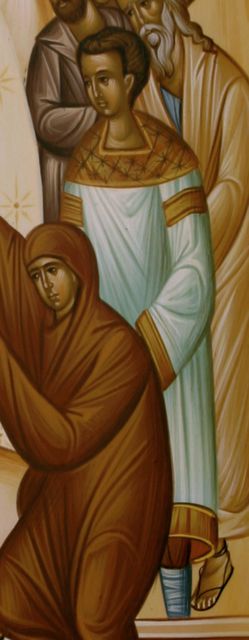
In the biblical myth of Cain and Abel in Genesis, Adam and Eve have two children. Cain is the first human born on the planet as the teaching-story unfolds. In it, Abel is the first innocent and the first human death.
The iconographer of this Easter icon places Abel in front of the people to Jesus’ left. These are the “living” witnesses except for Abel who is there not because he witnessed the crucifixion but because he is given a front row seat as the first person in the story of scripture’s unfolding of human-God relationship in which an innocent man is killed because of the rage of another – even the rage of a brother.
It is provocative that innocence plays such a role in the Easter icon. When I am maligned or mistreated or wrongly accused I find that going to the image of Jesus on the cross does not work for my meditation. Jesus is God. Jesus has power which perhaps I do not have. Jesus is doing his job as downloaded to him in his prayers. I sometimes need an image which seems closer to my own experience.
I am not one who prays to the saints. I pray directly to God (even when I am furious at him!) while honoring the saints. But I will admit that at times when I feel that I am embroiled in injustice or am the object of misdirected rage or envy, it helps me to go back to this icon and spend time isolating this innocent boy in my mind and in my past lives.
He was a simple shepherd and his brother a gardener. When it comes time for them to offer to God a portion on their produce, God does not accept Cain’s offering but does accept Abel’s. Cain becomes enraged and kills his brother out of envy of God’s acknowledgement. And it is in this passage that we first hear the line “Am I my brother’s keeper?” when God asks Cain where his brother Abel is.
After weeks of focus on our sinfulness in Lent and Holy week, Easter is a time to look hard at our beauty, our innocence and our vulnerability – and our belovedness in God’s eyes. Notice in the icon that that same gentle blue of the mandorla (the almond shape through which Jesus passes to bring life from death) is a similar shade of light blue as that which is in Abel’s tunic – a classical color in iconography for vulnerability and often, appropriately, a color for Mary as well. The turquoise of Abel’s tunic is a gentle badge of honor and we too – each of us – have in our past or present some aspects and some experiences of having been maligned, misjudged, abused or skape-goated by the anger, anxiety, fear or envy of others. It happens all the time. This image from this icon reminds me that God sees all things. God not only knows our sins. God knows our beauty, our vulnerability and our undeserved suffering and our loss.
There are so many weak, insecure people out there whose rage at the strong, the kind or the gifted is profound. They are doing terrible damage every day – physical and psychic. And it is their deep insecurities which fuel their rage, their manipulation and their misdirected, often subconscious rage. One can see this rage all over the place in our lives. One can see it in a father’s rage at seeing how his wife is gifted in connection with their child or in a despot’s rage at seeing how good-hearted and willful are his subjects. One can see it in a CEO’s rage at a manager’s choice of kindness over manipulation in company structure. One can see it in a new Bishop’s envy of talent or fear of his own charm-venired talentlessness being one day exposed. One can see it in a farmer whose wife has decided to break a contract of relational mediocrity or abuse. Movies and books about in the subject of rage and innocence as does the Bible. If fact, it forms the basis of most dramas which we ingest from the entertainment industry like ravinous wolves feeding on a corpse.
Ok. Sure. I sin. But Easter is a time to go past that, and to stand with Jesus as a witness to his innocence, and to see where ours is or has been too. We spend so much time wallowing in our sins and very little appreciating our innocence. Political, social marital and ecclesial abuse is rampant in such a fearful society as ours is. Then add to that our financial fragility and you have a powder-keg on your hands.
Psalm 17 – the prayer of an innocent person – ends with this promise of joy to all who have ever suffered from the abuse which comes form insecurity:
“But I will see you, because I have done no wrong; and when I awake, your presence will fill me with joy.”

